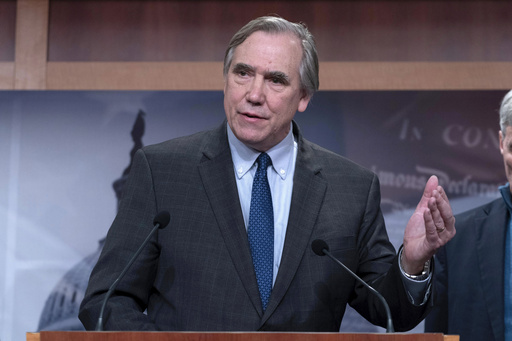WASHINGTON — On Wednesday, House Republicans unveiled a new budget proposal that aims to pave the way for advancing key domestic initiatives put forth by President Donald Trump. This plan includes provisions for tax reductions totaling up to $4.5 trillion alongside a $4 trillion raise in the debt ceiling, enabling the government to keep meeting its financial obligations.
The budget proposal calls on various House committees to implement spending cuts of at least $1.5 trillion, while setting a broader goal of achieving $2 trillion in reductions over a decade. This plan acts as an initial step in a lengthy legislative journey that would enable the Republicans to advance some of their essential items with a simple majority. Votes on the plan are anticipated during a House Budget Committee meeting scheduled for Thursday. House Speaker Mike Johnson expressed confidence that the proposal would move through the committee without issues.
Johnson has outlined an ambitious timeline for the adoption of the budget resolution and related legislation, yet there are underlying tensions within the Republican ranks regarding the magnitude of tax and spending reductions contemplated. Some party members are advocating for more substantial tax-cut measures than those presented in the current proposal, while others are requesting deeper spending cuts.
“There’ll be extensive negotiations ahead,” Johnson stated. “There are numerous variables to consider, yet our aim remains to fulfill all the commitments made during the president’s campaign along with the complete agenda, and we believe we have time for that.”
Typically, budget resolutions are seen as declarations of intent, but the 45-page outline extends beyond mere policy intentions, offering specific directives for House committees regarding federal funding allocations. Republican leaders are eyeing significant reductions in social services, particularly targeting Medicaid, as they pursue substantial savings.
The Energy and Commerce Committee, which oversees health care expenditures, has been tasked with cutting $880 billion over the next decade. Meanwhile, the Education and Workforce Committee is expected to decrease spending by $330 billion, the Agriculture Committee by $230 billion, and the Transportation and Infrastructure Committee will look for at least $10 billion in cuts through 2034.
While certain programs face cuts, resources will be reallocated to other priorities championed by Trump, including a $100 billion increase in defense funding over the next ten years via the Armed Services Committee and an extra $90 billion for the Department of Homeland Security, which is executing initiatives aligned with Trump’s immigration policies.
House Democrats have responded critically to the proposed budget. Senate Democratic leader Chuck Schumer and House Democratic leader Hakeem Jeffries held a joint press conference to accuse Republicans of failing to act towards reducing costs for average Americans since gaining control of the White House and both congressional chambers.
“Why? Their main focus is to push through significant tax breaks for wealthy donors and large corporations,” commented Jeffries. “That’s the essence of the Republican budget.”
Democratic representatives are also worried that the plan could precipitate cuts to crucial safety net programs. Rep. Brendan Boyle, the leading Democrat on the House Budget Committee, expressed skepticism that the anticipated tax cuts would fulfill themselves through heightened economic growth, suggesting that cuts to various government programs, such as Medicaid, may be pursued.
“Their strategy increases the deficit and places the burden on the middle class, whether through rising prices or substantial cuts to vital programs,” remarked the Philadelphia lawmaker.
Republicans maintain that they do not aim to strip benefits from those dependent on Medicaid. However, they are contemplating implementing work requirements for more able-bodied adults within the program.
“Introducing work requirements for Medicaid is a logical step,” Johnson explained. “It’s practical, and it makes a significant difference not just in budgeting but also in public morale. Work provides dignity, and we aim to engage those not participating.”
To counterbalance some expenses associated with extending the tax cuts enacted during Trump’s previous administration, Republicans are exploring the elimination of certain clean-energy tax incentives that enjoyed support from Democrats during Biden’s tenure.
As House Republicans move forward with their agenda, Senate Republicans are embarking on a more targeted initiative focused on enhancing border security and increasing defense spending. Debates have raged since last year over whether to implement most of Trump’s agenda in one or two legislative efforts. Currently, the Senate is pursuing a two-bill strategy, while the House is following a single-bill approach, leaving the outcome uncertain.
On Wednesday, the Senate Budget Committee advanced its more limited budget plan along party lines. This plan allows for $175 billion for border security, $150 billion for defense, and $20 billion dedicated to the Coast Guard, without proposing to extend tax cuts, which will be addressed later in another bill.
Sen. Lindsey Graham, the committee chairman, emphasized that a majority of Americans support the reform of immigration policies. He highlighted that Immigration and Customs Enforcement is at a funding deficit, stating that more agents and detention facilities are essential for any deportation effort.
“We cannot afford to lag,” the South Carolina Republican remarked. “Our nation faces numerous risks, both domestically and globally.”
Republicans successfully rejected several amendments from Democrats aiming to shield Medicaid and the nutrition assistance program, SNAP, from cuts. Sen. Jeff Merkley, the leading Democrat on the committee, mentioned that these amendments were designed to ensure the congressional process does not result in increased costs for essential services and healthcare.
“American families should be concerned,” he added, reflecting the anxieties surrounding the proposed budget as discussions began to wind down.




